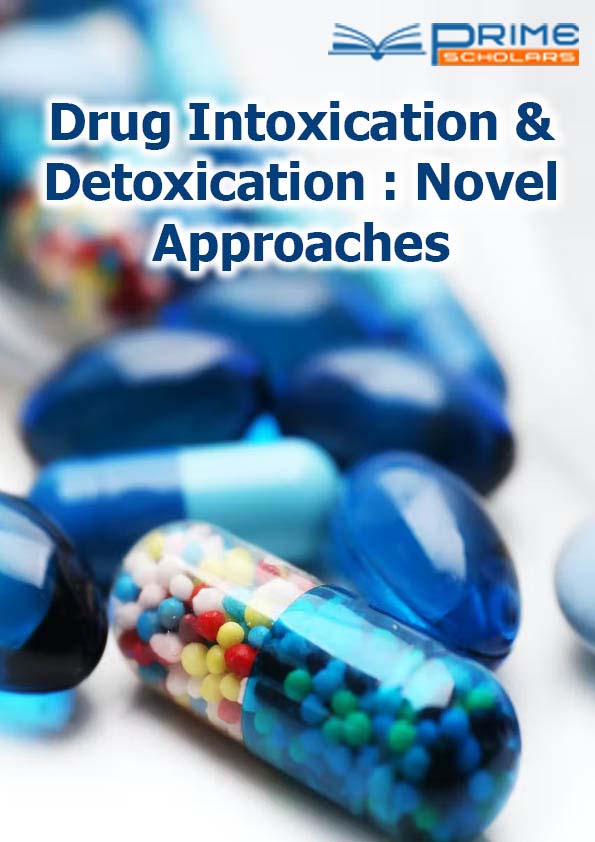Commentary - (2023) Volume 4, Issue 3
Drug Intake: A Complex and Controversial Issue
Waldo Emerson*
Department of Narcotics, University of Haifa, Israel
*Correspondence:
Waldo Emerson,
Department of Narcotics, University of Haifa,
Israel,
Email:
Received: 30-Aug-2023, Manuscript No. DIDNA-23-17913;
Editor assigned: 01-Sep-2023, Pre QC No. DIDNA-23-17913 (PQ);
Reviewed: 15-Sep-2023, QC No. DIDNA-23-17913;
Revised: 20-Sep-2023, Manuscript No. DIDNA-23-17913 (R);
Published:
27-Sep-2023, DOI: 10.36648/DIDNA 4.3.24
Description
Drug intake, the act of consuming substances for therapeutic
or recreational purposes, is a deeply intricate and multifaceted
aspect of human behavior. It encompasses the use of medications
to alleviate illness or discomfort, the recreational use of
psychoactive substances, and the harmful practice of addiction.
In this article, we explore the diverse nature of drug intake, its
societal implications, and the need for a balanced and informed
approach to this complex issue. At its most fundamental level,
drug intake is an essential component of healthcare. Medications
prescribed by medical professionals play a crucial role in
alleviating symptoms, treating diseases, and saving lives. The
use of pharmaceutical drugs, when done under the guidance
of healthcare providers, can significantly improve the quality
of life for countless individuals. However, even medicinal drug
intake is not without its challenges. Issues such as prescription
drug abuse, overmedication, and adverse side effects can arise
when there is inadequate oversight and regulation. Healthcare
professionals and patients must work collaboratively to ensure
the safe and responsible use of medicinal drugs. Recreational
drug use, which often involves psychoactive substances, is
a hotly debated and controversial aspect of drug intake. The
motivations for engaging in such practices are diverse, ranging
from relaxation and pleasure to social bonding and curiosity.
Some recreational drugs, like alcohol and cannabis, have been
legalized in various parts of the world, leading to questions
about their impact on public health, individual autonomy, and
societal norms. The recreational use of illegal drugs, such as
cocaine, heroin, or methamphetamines, remains a major concern
due to their potential for addiction, health risks, and the
criminal activity often associated with their distribution. Government
policies and public attitudes toward these substances
vary widely, making it difficult to devise a unified approach to
address recreational drug intake.
Perhaps the most troubling aspect of drug intake is addiction,
which can ensnare individuals in a vicious cycle of dependence,
physical and psychological harm, and societal consequences.
Addiction often involves the misuse of drugs, with users seeking
to replicate the initial euphoric experiences they provide.
Common substances associated with addiction include opioids,
amphetamines, and benzodiazepines. Stigmatizing addiction
can deter individuals from seeking help, thereby exacerbating
the problem. Dealing with drug intake, whether for medicinal,
recreational, or addictive purposes, demands a balanced approach.
A multifaceted strategy includes:
Education: Providing accurate information about drugs and
their effects is essential. Comprehensive drug education programs
can help individuals make informed decisions and reduce
the allure of experimentation. Prevention: Prevention
efforts should target vulnerable populations and emphasize
the importance of responsible drug intake. Focusing on factors
such as mental health and social support can also help reduce
the risk of drug misuse. Treatment: Ensuring access to effective
addiction treatment programs is paramount. Rehabilitation,
counseling, and harm reduction strategies are all critical components
of helping individuals recover from addiction. Regulation:
Sensible drug policy and regulation can help minimize the
risks associated with drug intake. Legalization, strict prescription
controls, and harm reduction measures are just some of
the tools available to policymakers.
Drug intake is a multifaceted issue that encompasses medicinal
use, recreational use, and addiction. It is a topic that challenges
societies to find a balanced approach that respects individual
choice while safeguarding public health. By emphasizing education,
prevention, treatment, and responsible regulation, we
can hope to address the complex and controversial nature of
drug intake and reduce the harms it can bring to individuals
and communities.
Acknowledgement
None.
Conflict Of Interest
The author’s declared that they have no conflict of interest.
Citation: Emerson W (2023) Drug Intake: A Complex and Controversial Issue. Drug Intox Detox: Novel Approaches. 4:24.
Copyright: © 2023 Emerson W. This is an open-access article distributed under the terms of the Creative Commons Attribution
License, which permits unrestricted use, distribution, and reproduction in any medium, provided the original author and source
are credited.
